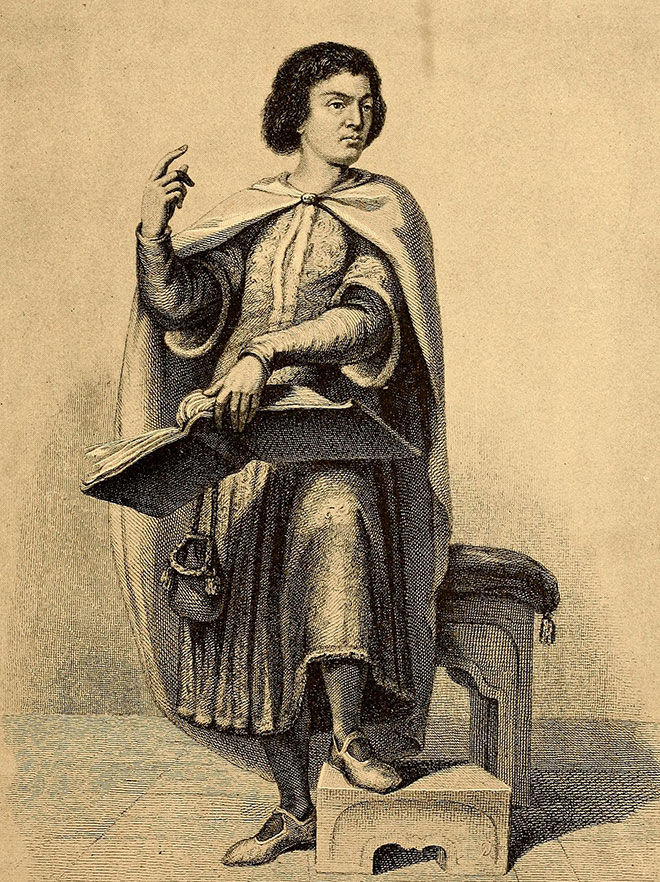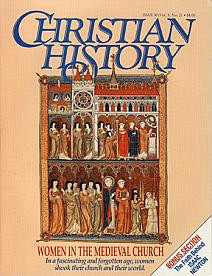PETER ABELARD PAID A STEEP PENALTY FOR HIS AUDACITY

[Abelard—public domain, from Internet Archive Book Images]
ABELARD AND HELOISE. The two names are linked in romance like Caesar and Cleopatra or David and Bathsheba. Although Abelard was a brilliant scholar, philosopher, and theologian, he is popularly remembered as the man who seduced his student Heloise, had a son by her, and secretly married her. An irate uncle of Heloise sent ruffians to castrate Abelard, who then wrote a book lamenting his calamities.
The brash spirit that caused Abelard to risk his career for an affair also caused him to out-argue his teachers, humiliate them, and turn them into enemies. However, he was eagerly sought out by students who recognized his ability as a teacher. He asserted a middle ground between realism (which says that a named quality such as “redness” is a universal reality with existence independent of any objects that may possess it) and nominalism (which says that a named quality is just a name; only individual things are real). His position was that universal ideas or forms are not realities, but necessary and useful mental constructs by which we can describe and understand similar characteristics in different objects.
His desire to apply reason to our understanding of the Bible and faith got him into trouble. Enemies claimed he was teaching heresy. He saw Christ’s death as a moral example rather than the necessary price of redemption. He argued that the culpability of a seemingly evil action depends on the intention behind it. Arguing that heathen philosophers had glimpsed the existence of the Trinity, he was accused of watering down Christian doctrine.
Most formidable of Abelard’s opponents was Bernard of Clairvaux. On this day, 25 May 1141,* a church council opened at Sens. Bernard led the assemblage in repudiating several of Abelard’s alleged teachings. The council compiled a list of propositions to send to the pope, seeking their condemnation. However, many were drawn from a work Abelard fiercely spurned as not his own. Others distorted his actual words or misunderstood his arguments. He wrote to Bernard of Clairvaux, his main opponent,
The devil, even if he does interpret Scripture badly, at least gives the actual words of Scripture which he misinterprets. But you are so far from both my words and my meaning and you labor over arguments taken from your inventions rather than from my sayings.
Pope Innocent II rightly condemned as errors the propositions he received. He had no way of knowing that only two or three of the thirteen accurately expressed Abelard’s views. Abelard himself wrote to Heloise after his condemnation,
I would not be an Aristotle if this were to separate me from Christ. . . . I have set my building on the cornerstone on which Christ has built his Church. . . . I rest upon the rock that cannot be moved.
At his death in 1142, Abelard left behind educational centers that eventually emerged as colleges within the University of Paris. A compilation he made of statements by major theologians (often contradictory) formed the basis for his pupil Peter Lombard’s famous Sentences, a book that would dominate European education for three centuries. His rational approach to scholarship and his glamorization of Aristotle’s writings profoundly influenced subsequent thought, reaching a high-water mark with Aquinas in the following century.
—Dan Graves
* Although Catholic Encyclopedia 1912 and other sources give 1140, I have followed the corrected dating by Werner Robl in “The Council of Sens in 1141 and its aftermath.”
----- ----- -----
For more about Abelard, see study module #206, Abelard’s Personal History
and "Heloise and Abelard’s Tumultuous Affair" in Christian History #30, Women in the Medieval Church






